#difference between SEO and PPC
Explore tagged Tumblr posts
Text
A Step-by-Step Guide to Choosing the Right SEO or PPC Strategy for Your Business

To drive traffic to your website effectively, two main strategies are Search Engine Optimization (SEO) and Pay-Per-Click (PPC). However, determining the right approach for your business depends on budget, goals, and target audience. This guide will lead you through selecting the suitable SEO or PPC strategy for your business, covering everything from plan setting to result measurement.
Step 1: Define Your Goals. Start by comprehending your objectives. What do you intend to achieve through increased website traffic? Is it brand awareness, lead generation, or sales growth? Identifying your goals lays the foundation for devising an appropriate strategy.
Step 2: Research, Your Target Audience, Understand whom you want to reach with your SEO or PPC campaign. Identify their interests and pain points. The more you know about your audience, the better you can tailor your strategy to their needs.
Step 3: Evaluate Your Budget. Assess the financial resources you will allocate to SEO or PPC efforts. SEO is a long-term investment, whereas PPC can yield quicker results at a potentially higher cost.
Step 4: Select Your Keywords Keywords are the phrases people use to search online. Picking the right keywords enables you to connect with your target audience when they search for your products or services.
Step 5: Craft High-Quality Content Quality content is pivotal for SEO success. To achieve a high search engine ranking, create top-notch content that resonates with your intended audience.
Step 6: Optimize Your Website Several technical factors influence your website's SEO performance, including site speed, structure, and keyword usage. Addressing these aspects can enhance your website's visibility.
Step 7: Monitor Your Results Regularly track the outcomes of your SEO or PPC campaign. This analysis enables you to identify effective strategies and make necessary adjustments.
Conclusion
Selecting the proper SEO or PPC strategy for your business might seem overwhelming. However, you can simplify the process by following the steps outlined in this guide. Keep in mind that there is no one-size-fits-all solution. Your optimal strategy will depend on your unique needs and objectives. Take the time to research and decide on the system that aligns with your business goals. More details : SEO vs PPC: The Ultimate Guide to Choosing the Right Strategy for Your Business
#SEO#Search Engine Optimization#PPC#Pay Per Click#SEO Vs PPC#SEO Vs SEM#Difference between SEO and PPC
0 notes
Text
#SEO and PPC#Difference between SEO and PPC#digital marketing agency#digital marketing company#digital marketing services#digital marketing services in india#graphics design services#website development services
1 note
·
View note
Text
The Core Differences Between B2B and B2C Marketing | Digital Retina
Discover the fundamental variances between B2B and B2C marketing strategies with Digital Retina. Unveil the tailored approaches required to effectively target businesses or consumers, ensuring your marketing efforts are precise and impactful.
Visit Us:-
Call Now:- 9953023123
#The Core Differences Between B2B and B2C Marketing | Digital Retina#best seo company in noida#social media marketing company in noida#social media marketing agency in noida#ecommerce seo packages#ppc company in india
0 notes
Text
Web Development Company in Gurugram With Plassey Technologies
Discover unparalleled web solutions with Plassey Technologies, the leading Web Development Company in Gurugram. From innovative website design to robust e-commerce platforms, we tailor solutions to suit your unique business needs. Our expert team blends creativity with cutting-edge technology to craft digital experiences that captivate and convert. Whether you're a startup or a seasoned enterprise, our personalized approach ensures success at every step. Elevate your online presence with Plassey Technologies and stay ahead in the dynamic digital landscape. Visit now!
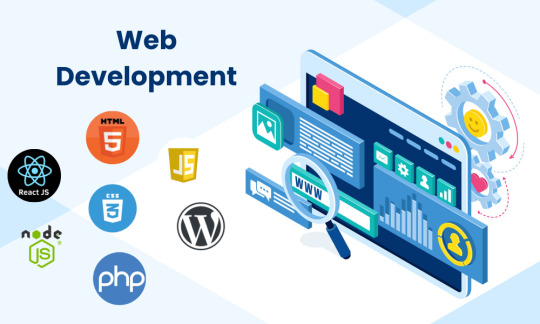
For More Info: Website Designing Company in Gurgaon Best SEO Company in Gurgaon best social media marketing company in gurgaon Best PPC Company in Gurgaon Mobile App Development Company App Development Company Gurgaon
Difference Between Traditional Marketing and Digital Marketing
#Website Designing Company in Gurgaon#Best SEO Company in Gurgaon#best social media marketing company in gurgaon#Best PPC Company in Gurgaon#Mobile App Development Company#App Development Company Gurgaon#Difference Between Traditional Marketing and Digital Marketing
0 notes
Text
🔍🚀 Level up your online presence and skyrocket your business with the power of SEO and PPC! 💼💰 Ready to dominate search engines and drive traffic straight to your website? 🌟💻 Let's chat about taking your digital marketing strategy to the next level today! 💪✨ #SEO #PPC #DigitalMarketingGuru
Shop Now : 🛒🛒🛒 September Group Buy Seo Tools Discount Coupon 50% OFF ( Promo Codes) 2023- Seo Group Buy
31 notes
·
View notes
Text
Choosing the Right Digital Advertising Agency: What You Need to Know
In today’s competitive market, choosing the right digital advertising agency can be the difference between a successful business and one that struggles to gain traction. With countless agencies offering a range of services, from social media management to SEO and PPC campaigns, finding the perfect fit for your brand can be a daunting task. But don’t worry—this blog will guide you through the essential factors to consider before making this crucial decision.
1. Understand Your Business Needs
Before you start looking for an agency, it’s important to understand what your business actually needs. Are you looking to increase brand awareness, drive traffic to your website, or boost sales? Different agencies specialize in different areas, so having clear goals will help you find an agency that can deliver the results you want. For example, if your focus is social media marketing, you’ll want an agency that has a strong track record in that space.
2. Look for Experience and Expertise
Experience is one of the most important factors to consider. A well-established agency with experience in your industry will already have an understanding of your market, competitors, and audience. Additionally, check if the agency has a diverse team of specialists. Whether it’s SEO, content marketing, graphic design, or analytics, a good digital advertising agency will have experts in each area to create and manage successful campaigns.
3. Check Their Portfolio and Case Studies
A reputable agency will have a portfolio showcasing their previous work and case studies detailing their successes. Reviewing this information will give you an idea of the kind of results they’ve delivered for other clients and whether their style matches your brand. Look for agencies that have worked with companies of similar size and industry as yours.
4. Consider Communication and Culture
How well an agency communicates with you is just as important as the services they offer. You want an agency that listens to your needs and keeps you updated throughout the campaign. Some businesses prefer a more hands-on approach, while others prefer to leave most decisions to the experts. Make sure the agency’s communication style and company culture align with your preferences. A strong partnership between you and the agency will lead to better results.
5. Transparency is Key
Transparency in pricing and strategy is crucial when choosing a digital advertising agency. Ask about their pricing model—do they charge per project, by the hour, or on a retainer basis? Moreover, ensure the agency is open about how they measure success. They should provide regular reports on campaign performance and be willing to explain the data. A good agency will not only show you the numbers but also help you understand what those numbers mean for your business.
6. Test Their Knowledge
A quick way to gauge an agency’s expertise is to ask them for an initial proposal or strategy for your business. Many agencies will offer a free consultation where they provide insights into how they can help you achieve your goals. This will give you a preview of their capabilities and whether they have a deep understanding of digital marketing strategies. Ask questions about the latest trends and tools they use to stay ahead of the competition.
7. Consider Their Network and Tools
A well-connected agency can offer more than just marketing campaigns. They may have relationships with influencers, media outlets, or platforms that can boost your visibility. Additionally, find out what tools they use for tracking performance, managing campaigns, and gathering insights. A modern digital advertising agency should be using advanced technology to deliver the best results.
8. Set Clear Expectations
Once you’ve narrowed down your options, set clear expectations from the beginning. Agree on key performance indicators (KPIs), timelines, and deliverables. This ensures that both parties are on the same page and helps to avoid misunderstandings down the road. The agency should be able to clearly define the results you can expect within a given timeframe.
Conclusion
Choosing the right digital advertising agency requires careful consideration. By understanding your needs, checking for experience, reviewing their portfolio, and ensuring they communicate well, you’ll be in a strong position to find a partner that can help your business grow. Transparency, expertise, and a good cultural fit are all key to building a successful relationship. Keep these factors in mind, and you’ll be well on your way to making the best decision for your business.
#media analysis#graphic design#advertising#social media#seo#branding#graphic designing#digital marketing#advertising agency#digital marketing agency
3 notes
·
View notes
Text
Exploring Traditional vs. Digital Marketing: A Comprehensive Comparison
In today's dynamic business world, marketing strategies play a crucial role in shaping brand perception, engaging customers, and achieving organizational goals. Among the myriad approaches available, traditional marketing and digital marketing emerge as two distinct methodologies. This extensive guide aims to delve into the fundamental disparities between these strategies and determine which offers greater long-term benefits for businesses.
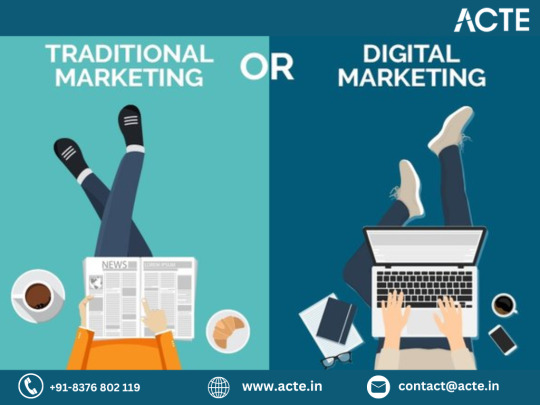
Traditional Marketing: An Overview
Traditional marketing encompasses conventional advertising methods that have been utilized for decades to reach audiences. This includes print advertisements, television commercials, radio spots, billboards, and direct mail campaigns. Historically, traditional marketing has been the primary avenue for businesses to promote their products or services to a broad audience.
Digital Marketing: A Modern Frontier
Conversely, digital marketing entails a diverse range of online strategies aimed at engaging consumers through digital channels. This includes search engine optimization (SEO), social media marketing, email marketing, content marketing, and pay-per-click (PPC) advertising. Leveraging the internet's power, digital marketing enables businesses to connect with target audiences in a more targeted, personalized, and measurable manner.
Key Differences Between Traditional and Digital Marketing
Reach and Targeting:
Traditional marketing typically targets a wide audience through mass media channels, while digital marketing enables precise targeting based on demographics, interests, and online behavior. This allows businesses to tailor their messages to specific audience segments for enhanced relevance and engagement.
Cost-effectiveness:
Digital marketing is generally more cost-effective than traditional marketing, especially for businesses with limited budgets. Online advertising platforms offer flexible budgeting options and performance-based pricing models, enabling businesses to optimize their marketing spend and achieve higher returns on investment (ROI).
Interactivity and Engagement:
Digital marketing fosters interactive communication between brands and consumers, facilitating greater engagement. Platforms like social media and email marketing allow businesses to interact with their audience in real-time, fostering relationships and gathering valuable feedback.
Measurability and Analytics:
Digital marketing provides robust analytics tools that enable businesses to track campaign performance accurately. Metrics such as website traffic, click-through rates, and conversion rates can be monitored in real-time, offering insights into campaign effectiveness and ROI. In contrast, traditional marketing efforts rely on offline methods, making measurement more challenging.
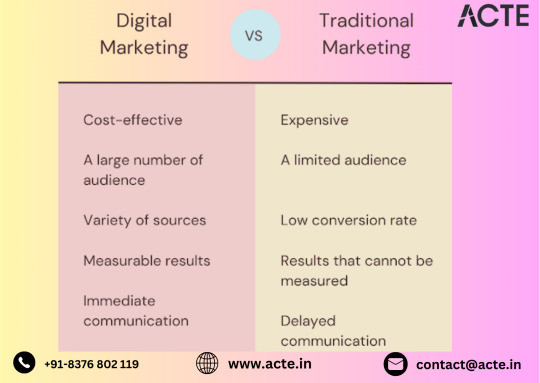
Determining Long-term Benefits
While both traditional and digital marketing have their merits, the shift towards digital channels and consumer behavior favor digital marketing for long-term success. Here's why:
Cost-effectiveness and ROI:
Digital marketing offers a higher ROI compared to traditional marketing due to its lower cost per impression and better targeting capabilities. This allows businesses to allocate their budgets more efficiently and achieve measurable results that contribute to sustained growth and profitability.
Targeting and Personalization:
Digital marketing enables precise targeting and personalized messaging, resulting in higher engagement and conversion rates. With data analytics, businesses can create tailored campaigns that resonate with specific audience segments, fostering brand loyalty over time.
Adaptability and Flexibility:
Digital marketing campaigns can be easily adjusted and optimized based on real-time data and feedback. Businesses can experiment with different strategies, refining their approach to stay ahead of competitors and meet evolving consumer needs.
Global Reach and Accessibility:
Digital marketing provides access to a global audience without geographical constraints. Online platforms offer businesses the opportunity to expand their reach and market presence across borders, tapping into new markets and opportunities for growth.
Conclusion: Navigating the Marketing Landscape
In summary, while traditional marketing remains relevant, digital marketing offers superior long-term benefits including cost-effectiveness, targeting capabilities, adaptability, and global reach. By embracing digital strategies, businesses can enhance brand visibility, engage audiences effectively, and drive sustainable growth in today's digital age.
#tech#training#digital marketing#digital marketing company#digital marketing course#email marketing#online marketing#search engine optimization#seo#seo services
3 notes
·
View notes
Text
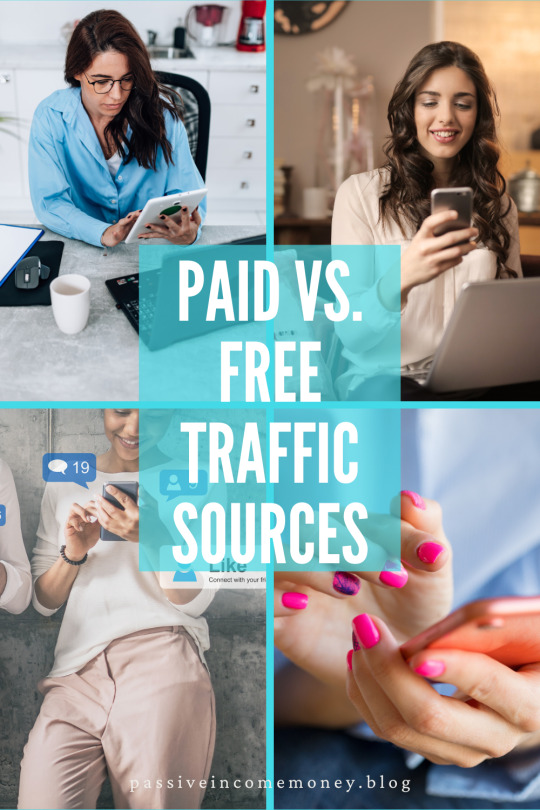
The Digital Marketing Dilemma: Paid vs. Free Traffic Sources
In the digital marketing world, traffic is the lifeblood of any online presence. It's the stream of visitors that brings potential customers to your website, and ultimately, drives conversions and sales. But not all traffic is created equal, and understanding the differences between paid, and free traffic sources can be crucial for a successful online strategy.
Paid Traffic: The Fast Lane to Visibility
Paid traffic is akin to a turbo boost for your website's visibility. It involves paying for advertising space to showcase your brand directly in front of potential customers. The most common forms of paid traffic include pay-per-click (PPC) campaigns, display ads, and social media advertisements.
Advantages of Paid Traffic:
Immediate Results: Once your ad campaign is live, you can expect to see an instant increase in traffic.
Targeting Capabilities: Paid traffic allows for precise targeting based on demographics, interests, and behaviours.
Scalability: You can increase your ad spend to scale up traffic as needed.
Disadvantages of Paid Traffic:
Cost: The most apparent downside is the ongoing expense. You pay for each visitor, and costs can escalate quickly.
Short-term Impact: Paid traffic often provides a temporary boost. Once you stop paying, the traffic typically drops off.
Here are some of the popular platforms for contextual ads:
Google Ads PPC (Pay-Per-Click) is a powerful advertising platform that allows businesses to display ads on Google's search engine results pages. Advertisers bid on keywords relevant to their target audience and pay only when a user clicks on their ad. This model offers the flexibility to control costs by setting daily budgets and bids for each click. With the right strategy, Google Ads PPC can be an effective way to drive targeted traffic to a website and increase online visibility.
Quora Ads PPC (Pay-Per-Click) is a form of advertising on the Quora platform, which allows advertisers to pay for each click on their ads. It's known for being a cost-effective option compared to other PPC platforms, with some campaigns reporting significantly lower cost-per-click (CPC) rates than those on Google or Facebook. Structuring campaigns carefully and optimizing ad delivery is crucial for success on Quora Ads. Advertisers can bid based on clicks, impressions, or conversions, tailoring their approach to their specific marketing goals.
Facebook Ads PPC (Pay-Per-Click) is a powerful advertising tool that allows businesses to target specific audiences on Facebook. Advertisers can create ads tailored to their business goals, such as increasing website traffic or boosting online sales. With PPC, you only pay when someone clicks on your ad, making it a cost-effective way to reach potential customers. Additionally, Facebook provides detailed analytics to help advertisers understand the performance of their ads and optimize their campaigns for better results.
Free Traffic: The Organic Approach
Free traffic, also known as organic traffic, doesn't cost anything directly. It's the result of people finding your website through search engines, social media shares, or other referral sources without paid promotion.
Advantages of Free Traffic:
Cost-Effective: It doesn't require a direct payment for each visitor, making it a more sustainable long-term strategy.
Credibility and Trust: Users typically perceive organic results as more credible than paid ads.
Long-lasting Results: The efforts you put into SEO or content creation can yield traffic for months or years to come.
Disadvantages of Free Traffic:
Time and Effort: It takes significant time and effort to build up organic traffic. SEO and content creation are long-term investments.
Unpredictability: Changes in search engine algorithms can impact your traffic levels overnight.
Here are some of the best free traffic sources that can help you attract visitors:
Search Engine Optimization (SEO): Optimizing your website for search engines can lead to a steady stream of organic traffic.
Email Marketing: Building an email list allows you to reach out directly to your audience.
Social Media Platforms: Sites like Facebook, Twitter, and Instagram can be powerful for sharing content and engaging with users.
Content Marketing: Creating valuable content helps attract and retain a loyal audience.
Blogging: Regularly updating a blog can help drive traffic and improve SEO.
Guest Posting: Writing articles for other websites can introduce your brand to a new audience.
Online Forums: Participating in forums like Reddit or Quora can drive traffic if you provide value in your posts.
Video Marketing: Platforms like YouTube offer a way to reach a vast audience with engaging video content.
Podcasting: Starting a podcast can help you reach a new audience through audio content.
Webinars: Hosting webinars can attract an audience interested in your expertise.
Influencer Collaborations: Partnering with influencers can help you tap into their follower base.
SEO Tools: Utilizing free SEO tools can improve your site's visibility.
Press Releases: Announcing news can get coverage and drive traffic.
E-books and Guides: Offering free resources can attract visitors searching for information.
Affiliate Programs: Encouraging others to promote your site can increase traffic.
Each of these sources requires time and effort to develop, but can lead to significant traffic growth over time.
Combining the Best of Both Worlds
While the debate between paid and free traffic sources can seem polarizing, the most effective strategies often involve a blend of both. Paid traffic can provide a quick influx of visitors and help test new markets or products. At the same time, building a solid foundation of free traffic through SEO and content marketing can ensure a steady flow of visitors over time.
Ultimately, the choice between paid and free traffic sources will depend on your business goals, budget, and timeline. By understanding the strengths and limitations of each, you can craft a balanced approach that drives both immediate results and sustainable growth.
For more insights into optimizing your website's traffic, consider exploring the nuances of SEO and Google Ads management, or how content quality can boost your organic reach. Remember, in the realm of digital marketing, diversity is key, and leveraging multiple traffic sources can lead to a more robust and resilient online presence.
2 notes
·
View notes
Text
6 PILLERS OF DIGITAL MARKETING
Search Engine Optimization (SEO): Search engine optimization is the practice of optimizing your web pages to increase your website’s visibility organically in the search engine result pages (SERPs).It involves optimizing your website to rank higher in search engine results pages (SERPs) and increase visibility and organic traffic. This includes keyword research, on-page optimization, link building, and content creation.
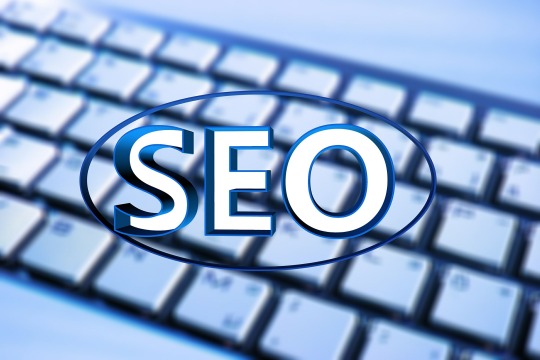
SEO is completely different from search engine (paid) advertising. With paid advertising, you’re paying search engines like Google to show your website on the search result page. Instead, with SEO, you’re optimizing your website so it organically shows up on the first page of the search result. The number of visitors who come to your website through these search results is defined as organic traffic (because they found your website themselves).
Pay-Per-Click Advertising (PPC):PPC stands for pay-per-click, a model of digital advertising where the advertiser pays a fee each time one of their ads is clicked. Essentially, you’re paying for targeted visits to your website (or landing page or app)

It involves placing ads on search engine results pages or other websites, and paying a fee each time someone clicks on the ad. This includes Google Ads, Bing Ads, and social media advertising.
Content Marketing:Content marketing is a strategic marketing approach focused on creating and distributing valuable, relevant, and consistent content to attract and retain a clearly defined audience — and, ultimately, to drive profitable customer action.
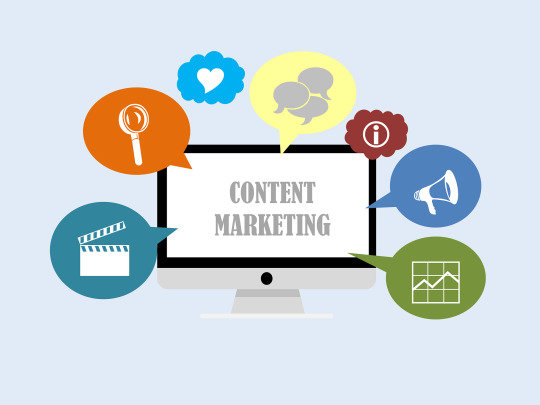
It involves creating and sharing valuable, relevant, and consistent content to attract and retain a clearly defined audience. This includes blog posts, articles, videos, podcasts, and social media content.
Social Media Marketing:
Social media marketing is a form of digital marketing that leverages the power of popular social media networks to achieve your marketing and branding goals. But it’s not just about creating business accounts and posting when you feel like it. Social media marketing requires an evolving strategy with measurable goals and includes:

Maintaining and optimizing your profiles.
Posting pictures, videos, stories, and live videos that represent your brand and attract a relevant audience.
Responding to comments, shares, and likes and monitoring your reputation.
Following and engaging with followers, customers, and influencers to build a community around your brand.
Email Marketing:Email marketing is a powerful marketing channel, a form of direct marketing as well as digital marketing, that uses email to promote your business’s products or services. It can help make your customers aware of your latest items or offers by integrating it into your marketing automation efforts. It can also play a pivotal role in your marketing strategy with lead generation, brand awareness, building relationships or keeping customers engaged between purchases through different types of marketing emails.
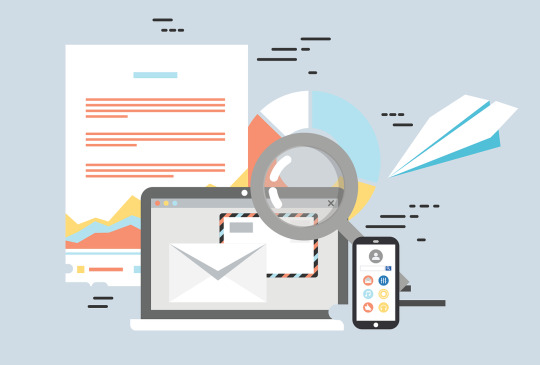
Analytics and Reporting: It involves measuring and analyzing your digital marketing efforts to understand their effectiveness and optimize your strategies. This includes tracking website traffic, conversion rates, ROI, and other key performance indicators.

#digital marketing#searchengineoptimization#ppc services#emailmarketing#marketing tips#analytics#social media marketing#seo expert#seo tools#content creation#content marketing
15 notes
·
View notes
Text
Your One-Stop Solution for Digital Marketing
In today's digital age, businesses are increasingly realizing the importance of a strong online presence to attract and engage with customers. As a result, the demand for comprehensive and effective digital marketing strategies has skyrocketed. This is where the concept of the "Digital Warehouse" comes into play. The Digital Warehouse is a revolutionary concept that serves as a one-stop solution for all your digital marketing needs. In this article, we will explore the various aspects of the Digital Warehouse, its benefits, services offered, success stories, and why it should be your go-to choice for all things related to digital marketing. Understanding the Digital WarehouseThe Digital Warehouse is essentially a centralized hub that brings together a wide range of digital marketing services and tools under one roof. It acts as a repository of various resources, such as marketing software, analytics tools, content creation platforms, advertising platforms, and more. By leveraging the power of technology and automation, the Digital Warehouse streamlines the entire digital marketing process, making it more efficient and effective.
Benefits of Utilizing the Digital Warehouse
Cost-Effectiveness: One of the major advantages of using the Digital Warehouse is the cost-effectiveness it offers. By consolidating all your digital marketing needs in one place, you can streamline your operations and eliminate the need to invest in multiple tools and services separately. This ultimately leads to significant cost savings.
Time-Saving: With everything you need in one place, the Digital Warehouse eliminates the need for switching between multiple platforms or juggling different tools. This results in a considerable amount of time-saving, allowing you to focus on other important aspects of your business.
Enhanced Collaboration: The Digital Warehouse promotes collaboration among different teams, such as marketing, sales, and content creation. With all the resources available in a centralized location, teams can easily communicate, share insights, and work together seamlessly to achieve common goals.
Data-Driven Insights: One of the key features of the Digital Warehouse is its ability to generate comprehensive and real-time data insights. The analytics tools integrated into the platform provide valuable data and metrics that can be used to measure the effectiveness of your marketing campaigns, identify trends, and make data-driven decisions.
Scalability: The Digital Warehouse is designed to cater to businesses of all sizes, from startups to large enterprises. It offers scalable solutions that can be customized to meet the specific needs and goals of your business. As your business grows, you can easily scale up your digital marketing efforts without any hassle.
Services Offered by the Digital Warehouse
The Digital Warehouse encompasses a wide range of services to cater to all your digital marketing needs. Some of the key services offered include:
Search Engine Optimization (SEO): The Digital Warehouse provides advanced SEO tools and techniques to optimize your website for search engines, improve your organic rankings, and drive more targeted traffic to your website.
Pay-Per-Click (PPC) Advertising: The Digital Warehouse offers robust PPC advertising platforms that enable you to create and manage highly targeted ad campaigns across various channels, such as Google Ads, Facebook Ads, and LinkedIn Advertising.
Content Marketing: Content is the king in today's digital landscape. The Digital Warehouse provides access to content creation platforms, content management systems, and content distribution tools to help you create, publish, and promote engaging content that resonates with your target audience.
Social Media Marketing: The Digital Warehouse includes social media management tools and social advertising platforms that allow you to effectively manage your social media presence, engage with your audience, and run targeted ad campaigns across popular social channels.
Email Marketing: Email marketing continues to be a highly effective digital marketing strategy. With the Digital Warehouse, you can access powerful email marketing platforms that facilitate email campaign creation, automation, and analysis to drive customer engagement and conversions.
Analytics and Reporting: The Digital Warehouse integrates advanced analytics tools that provide in-depth insights into the performance of your digital marketing campaigns. You can track key metrics, measure ROI, and generate comprehensive reports to assess the effectiveness of your strategies. Why Choose the Digital Warehouse for Your Digital Marketing Needs
The Digital Warehouse stands out as the preferred choice for businesses looking to streamline their digital marketing efforts for several reasons:
Comprehensive Solutions: The Digital Warehouse offers a wide range of services, tools, and resources, ensuring all your digital marketing needs are met in one place.
Expertise and Support: The Digital Warehouse is backed by a team of experienced digital marketing professionals who are dedicated to providing expert guidance and support. They are well-versed in the latest trends and best practices, helping you stay ahead of the curve.
User-Friendly Interface: The Digital Warehouse is designed with user experience in mind. It offers an intuitive interface that makes it easy for users of all levels of expertise to navigate and utilize the platform effectively.
Continuous Innovation: The Digital Warehouse keeps up with the ever-evolving digital marketing landscape and continuously updates its services and tools to meet the changing needs of businesses.
In conclusion, the Digital Warehouse is a game-changer in the world of digital marketing. It provides businesses with a centralized hub where they can access a wide range of digital marketing services, tools, and resources. By leveraging the benefits of the Digital Warehouse, businesses can enhance their online presence, drive more targeted traffic, and achieve their marketing goals more effectively. So, why wait? Embrace the power of the Digital Warehouse and take your digital marketing efforts to new heights.
2 notes
·
View notes
Text
Why does Digital Marketing Matter?
Computerized Advertising Has Overcome Any Barrier Between Disconnected Shops And Client Associations. Since Computerized Showcasing Involves Online Stages For Promoting, It Is Less Tedious, Simple To Get To, And In Particularly, Financially Savvy.
The Computerized Market Is Multi-Layered, And Subsequently, Organizations And Advertisers Can Apply An Assortment Of Sure Achievement Showcasing Procedures Through Website Design Enhancement And SEM, Virtual Entertainment Promoting And Publicizing, and Content Creation For Further Developing The Brand Execution, Commitment, Making Mindfulness.
The Explanation Advanced Promoting Ends Up Being Practical When Contrasted With Customary Showcasing Or Disconnected Shops Is That The Advertiser Has Full Command Over Publicizing. At The Point When Organizations Decide To Publicize On The Web, Via Virtual Entertainment, Site, Or Through Messages, They Can Set A Financial Plan For Promotion Space.
Likewise, They Can Follow The Measurements, Execution Insights, Pick/Control Their Crowd And Gain Input.
Computerized Showcasing Additionally Offers Customized Choices. For Instance, Organizations Can Focus On Their Crowd In View Old Enough, Topographical Area, And Goal.

1. Search Engine Optimization (SEO):
The Most Moving And Economical Advanced Advertising Module In 2020 Must Be Website Improvement (Web Optimization). North Of 67 Thousand Individuals Scan On Google For Each Passing Second. Around 61% Of Advertisers Accept Website Design Enhancement Has Ended Up Being A Forward Leap For Computerized Promoting.
Organizations With Showcasing Techniques Have Now Begun To Dispense Around 41% Of Their Promoting Financial Plan To Web Optimization. One Can Anticipate That It Should Arrive At 45% Before The Year Over 2020. It Validates How Organizations Comprehend And Give Significance To Search Engine Optimization.
So What Precisely Is Website Optimization? Website Streamlining Normally Alluded To As Search Engine Optimization Helps Increment The Perceivability Of Your Webpage And Online Presence To Acquire Expected Leads Or Traffic.
Web Search Tools Like Google, Bing, And Yippee Through Crawlers (Bots) Go Through Each Website That Is Firmly Connected With The Catchphrases Input In The Web Search Tool And Shows It On The Main Page Of The Favored Web Search Tool, Web Search Tool Results Page (SERP).
More The Snaps On Your Site, More The Significance And Prominence It Will Acquire Which Will, Thus, Increment The Commitment Of Your Site. Along These Lines, Website Optimization Helps the Transformation Rates (CR) Of Your Webpage.
Web Optimization Advanced Advertising Modules Will Zero In On The Many Elements That Add To Web Search Tool Calculations Like Area, URL, Meta Portrayal, Watchwords, Title Labels, Slugs, Speed Of Your Site, Third Party Referencing, And Numerous Different Highlights Of Web Optimization.
2. Search Engine Marketing (SEM):
Followed By Website Optimization, SEM Is The Second Most Vital Module To Grasp Computerized Promoting. When You Find Out About What Is Website Design Enhancement, How It Works, And What The Elements Add To It, The Following Stage Would Adjust This Information For Publicizing Carefully.
Web Search Tool Promoting Or SEM Is The Showcasing Of Your Business Through Paid Ad So Your Webpage Shows Up On The Highest Point Of The Web Search Tool Page Result (SERP) Bringing About a Higher Transformation Rate And Profit From Speculation (Return For Money Invested).
These Computerized Advertising Modules Will Zero In On SEM Conditions Like Paid Search Promotions, Pay Per Snap (PPC), Cost Per Snap (CPC), and Cost Per Thousand Impressions (CPM).
Further, The SEM Module Will Zero In On The Most Famous SEM Stages:
Google Advertisements:
Google's Internet Promoting Stage Google Advertisements Offers Paid Notices That Will Rank Your Webpage On Top Of The Web Search Tool Result Page (SERP). It Deals With The Compensation Per-Click ( PPC) Include.
3. Social Media Marketing
The Central Point That Add To The Internet Based Presence And Commitment Of Your Webpage Are Either Through Web Optimization Or Online Entertainment. Furthermore, Since We're Discussing Computerized Showcasing The Most Advanced Thing About The Web That Will Assist With Arriving At The Greatest Number Of Individuals Must Be Online Entertainment. Computerized Showcasing Is Inadequate Without A Virtual Entertainment Crusade. Thus, It Means A Lot To Concentrate On Website Optimization Alongside SMM.
Virtual Entertainment Advertising (SMM) Through Online Entertainment Attempts To Use The Crowd For Memorability, Brand Mindfulness, And Above All Building Solid Organizations And Crowds. Moving Toward a Way For Commitment, Correspondence, And Collaboration To The Average Folks Is Additionally A Simple. Besides, Web-Based Entertainment Showcasing (SMM) Is Multi-Layered And Savvy.
Virtual Entertainment Showcasing (SMM) Module Might Incorporate Web-Based Entertainment For Content Creation, Well-Known Web-Based Entertainment Stages And Its Intensity, Figuring Out The Key Execution Pointers (KPIs) Of SMM, Etc.
4. Social Media Advertising
After Seeing Every One Of The Web-Based Entertainment Promoting Factors, The Following Module Will Zero In Via Virtual Entertainment Publicizing (SMA). It Is A Cruel Reality That The Crowd Will Just Follow Brands With the Most Extreme Natural Devotees Or Arrive At Via Web-Based Entertainment And Quality Substance. So How Would We Acquire The Trust And Reliability Of Individuals To Assemble A Natural Crowd For The Brand?
This Is Where Virtual Entertainment Publicizing (SMA) Comes In. Each Well-Known Virtual Entertainment Stage Has Its Promotion Crusade Planned Explicitly For Computerized Publicizing. The Most Famous Web-Based Entertainment Promotion Crusades Are Facebook Advertisements With Around 93% Commitment, Trailed By Instagram With Around 72% Commitment.
Every One Of These Web-Based Entertainment Promotion Administrations Is Not Difficult To Get To And See Yet There Are A Few Details And Significant Information That Goes Into It And Should Be Learned And Rehearsed. Thus, The SMA Module Will Zero In On Utilizing The Virtual Entertainment Promotion Crusade As An Impetus To Contact The Greatest Crowd And Make Brand Mindfulness And Acknowledgment.

5. Email Marketing:
Email Advertising Has Existed Since The Presence Of The Web. It Is The Best Method For Focusing On A Group Of People And Converts Them Into Faithful Clients.
Even though Most Messages Are Viewed As Spam And Lay Inactive In Clients' Inboxes, There's Much More That Email Showcasing Adds To The Advancement Of Your Business On The Off Chance That You Use It Carefully And Actually.
These Computerized Showcasing Modules Will Zero In On The Best Way To Decisively Involve Mailing In Support Of Yourself Through Different Devices And Procedures.
8 notes
·
View notes
Text
Why SEO takes time instead of Google Ads?

SEO (Search Engine Optimization) and Google Ads (formerly known as Google AdWords) are two different digital marketing strategies, each with its own advantages and timelines. The reason why SEO takes time compared to Google Ads can be attributed to the nature of how these strategies work:
Organic vs. Paid Traffic: The fundamental difference between SEO and Google Ads is the source of traffic they generate. SEO focuses on obtaining organic traffic from search engine results, while Google Ads provides paid traffic through pay-per-click (PPC) advertising. Organic traffic, though free, takes time to build because search engines need to crawl, index, and rank your website based on various factors.
Algorithmic Ranking: Search engines like Google have complex algorithms that determine how web pages rank in search results. SEO involves optimizing your website to align with these algorithms, which can be dynamic and subject to frequent updates. As a result, it takes time to implement changes, monitor their impact, and gradually improve rankings.
Content and Authority Building: SEO heavily relies on content creation and building website authority. Creating valuable, high-quality content and establishing your site as an authoritative source in your industry or niche takes time. It requires consistent efforts, such as creating informative blog posts, gaining backlinks from reputable websites, and engaging with your audience.
Competition: Depending on your industry and target keywords, you may face significant competition in the organic search results. Competing with well-established websites and brands can take time and effort to overcome.
Long-Term Strategy: SEO is more of a long-term strategy, where the efforts put in today may not yield immediate results, but they can compound over time. Once your website gains traction and higher rankings, it becomes more sustainable and cost-effective.
On the other hand, Google Ads can provide immediate visibility and traffic to your website since you are paying for ad placements. As soon as you set up your campaigns and bid on relevant keywords, your ads can start appearing on Google’s search results or partner websites. The results are almost instantaneous, but they rely on your budget and ad spending. Once you stop running ads or reduce the budget, the traffic stops.
In conclusion, SEO takes time because it involves organic growth, algorithmic ranking, content building, and authority development. On the other hand, Google Ads can deliver quick results through paid advertising but requires a continuous budget to maintain traffic flow. Both strategies have their place in a comprehensive digital marketing plan, and the choice between them depends on your goals, budget, and the nature of your business.
5 notes
·
View notes
Text
SEO and PPC:- Differences with Pros and Cons
SEO and PPC:- Differences with Pros and Cons
If we compare SEO and PPC then it depends upon the current situation of your business. I have spent some years in this field and noticed that SEO serves better in terms of long-term success. But it is a big challenge for new businesses to dive into SEO and PPC will work for it by making it fast promoted accurately.
It is a big challenge or we can call it a strategy by which we understand our customer’s nature and identify whether SEO is suitable or PPC is applicable or the Combination of both. In this article, we will look at some profits and losses of SEO and PPC and Discuss some beneficial strategies for your improved search results.
A main key difference between SEO and PPC is that Paid Ads are visible at the top of the page and below that organic results are visible, the SEO gives free organic traffic whereas PPC works on a cost-per-click Phenomena. Sometimes a combination of both works perfectly and gives the best results.
SEO: Get results organically (Search engine Optimization)
Search engine optimization is a process of optimization of the website according to the nature of the search engine for ranking to its SERP. Both Search results and social media results are dropped into it.
Keyword research is essential. For any blog or any website, we have to target any particular keyword on which our blog or website will rank on the search result page.
On-Page SEO is the next step. Optimizing the content of a page by placing keywords in the correct place and with attractive titles and also optimizing images.
Off-Page SEO is an activity done outside the page for its ranking. Mainly it includes building backlinks for a website which is 3rd ranking factor of Google.
Technical SEO is all about solving the technical complications of any website. It includes indexing the content, page speed, etc.
Pros
Branding and Awareness. Your targeted keywords will help you to get in front of your potential audience in an advertising manner and gives them a positive image. If you are solving your searcher's queries then this can be a big benefit for you to reach out as a big brand.
Trust and Credibility. Visibility in SERP by solving queries which is a time-consuming process can compel the audiences to look for your services or products. This builds the trust of professionalism.
Traffic and cost. Driving traffic to your website will increase your business and SEO is not easy an task but it is more cost-effective in comparison with other advertising techniques.
Consistent Traffic and long-term results. For some reason, if you could not publish the stuff then also the traffic will be continued based on previous posts. And the main thing is if SEO is done once then its effect will be for a long time.
Cons
Sometimes due to big giants in the market, your website will not rank or it will take to rank, or maybe clicks and traffic will be very low. At that time you should consider changing your SEO strategy.
Time taking Process and requires original content. SEO is time taking process and maybe it can take more and more time but you can correct it with your proper strategy.
PPC:- Pay-Per-Click
It is a marketing or advertising technique where the marketer will pay money to search engines whenever the Ad will be clicked. This includes both search ads and social media ads also.
Keyword research is the same as you do for SEO, for what the audiences are searching.
Bidding is a step where you decide how much you will pay Google Per click.
Creating Ad is an another important step, it will confirm where your ad will be placed and what will your ad will speak.
Targeting the potential audience will be the most important thing. Who is clicking your ad?
Pros
PPC is an instant process. You can target any platform supporting PPC and run ad Campaigns
PPC allows segmentation targeting. You can target the audiences, age group, geographic location, etc. for accurate results.
You can check whether it is working or not and if working then it is profit-making or loss-making.
Cons
PPC can be expensive. If you and your competitor are bidding on the same keyword then google will show the result of who is bidding on more money.
It can be loss-making. If your ad is clicked by the wrong group of an audience then your money will be wasted.
Final thoughts are here that we cannot tell Either PPC is suitable or SEO is suitable for your business. Because if you have a local business then an SEO with few no. of leads can work but if there is an e-commerce business that is competing with big giants will be more difficult to rank.
If you are looking for SEO and PPC services then Manyfits - A Digital marketing company in Jabalpur can help you. For more information please visit here:- https://manyfits.com/our-services/
Thank you.
#SEO and PPC#Difference between SEO and PPC#digital marketing agency#digital marketing company#digital marketing services#website development services#graphics design services#digital marketing services in india
0 notes
Text
difference between affiliate marketing and digital marketing
Affiliate marketing and digital marketing are both forms of online marketing, but they differ in their approach and goals.
Affiliate marketing is a type of performance-based marketing where a business rewards affiliates for promoting their products or services. Affiliates earn a commission for each sale or conversion they generate for the business. In affiliate marketing, the focus is on driving traffic and sales through referrals and recommendations from trusted sources. It involves building relationships with affiliates who have a relevant audience and can drive targeted traffic to the business.
Digital marketing, on the other hand, is a broader term that encompasses all marketing efforts that use digital channels, such as email, social media, search engines, and websites, to promote a brand or product. It includes a range of tactics, such as search engine optimization (SEO), pay-per-click (PPC) advertising, content marketing, social media marketing, email marketing, and more. The goal of digital marketing is to increase brand awareness, engagement, and conversions through various channels and tactics.
In summary, affiliate marketing is a type of digital marketing that focuses on rewarding affiliates for driving sales or leads, while digital marketing encompasses a wide range of online marketing tactics and strategies.

3 notes
·
View notes
Text
Difference between Affiliate marketing and Digital marketing
In the world of online business and marketing, two terms that often get thrown around are affiliate marketing and digital marketing. While they share some similarities, there are also some key differences between these two approaches to online marketing. In this post, we’ll take a closer look at each one and explore the differences.
What is Affiliate Marketing?
Affiliate marketing is a type of performance-based marketing where an affiliate promotes a product or service on behalf of a merchant and earns a commission for each sale or action that is generated through their unique affiliate link. Affiliates can promote products through a variety of channels, including blogs, social media, email marketing, and more.
One of the key advantages of affiliate marketing is that it allows affiliates to earn passive income by promoting products that they believe in and that align with their audience’s interests. It also allows merchants to reach a wider audience and drive more sales without having to invest in traditional marketing channels like paid advertising.
What is Digital Marketing?
Digital marketing is a broader term that encompasses a wide range of marketing tactics and strategies that are designed to reach and engage with audiences through digital channels like search engines, social media, email, and more. Digital marketing can include activities like search engine optimization (SEO), pay-per-click (PPC) advertising, social media marketing, content marketing, email marketing, and more.
The main objective of digital marketing is to generate leads and sales by building brand awareness, driving traffic to a website or landing page, and converting that traffic into paying customers. Digital marketing can be highly effective when done right, but it requires a well-planned strategy and ongoing optimization to achieve success.
Key Differences between Affiliate Marketing and Digital Marketing
While affiliate marketing and digital marketing share some similarities, there are also some key differences to keep in mind:

#digital marketing#social media marketing#search engine optimization#google ads#internetmarketing#affiliatemarketing
5 notes
·
View notes
Text
The Ultimate Guide for hiring a digital marketing agency
Hiring a digital marketing agency to expand your company's digital skills may seem daunting in this digital age. The PR Newswire analysis projects that global digital marketing will grow between 2020 and 2027 at a compound annual growth rate of 10.3%, reaching USD 640.2 billion.
It shows the enormous future potential of digital marketing, making it crucial for any company to incorporate digital marketing into its strategic marketing plan.
The following list of criteria might assist you in choosing your reliable digital partner if you're wondering how to choose digital marketing firms:
Transpire, a complete-service digital marketing firm
Try to verify the digital marketing agency's legitimacy from internal and external sources. Search Engine Optimization (SEO), Social Media Marketing, Pay Per Click (PPC), email marketing, and other services are provided by digital marketing agencies.
Choose an agency that can efficiently handle your digital marketing demands for a high ROI and affordable cost. For better outcomes, working with a company that houses all of the necessary skills under one roof is preferable.
Click Specialization and Expertise
Look for an agency specializing in the area or service you need before selecting a digital marketing firm. An inexperienced company might harm the clientele and drive up the cost of services. Dentists are more effective than general physicians for oral problems. Such conditions necessitate specialized issues and specialized digital marketing solutions.
Speaking clearly or being direct
Some organizations adhere to the philosophy of sending out responses after the deadline has passed and provide no updates on the task's status. They are concerned about their clientele yet need more direct answers.
Thus, it is always recommended to conduct a SWOT analysis before showing interest in any agency. It is the best match for you if it aligns with the philosophy and values of your organization.
Understand their pricing guidelines
You lose your reputation and income the instant you make a pricing error. The same holds when purchasing digital solutions for your company.
Decide which pricing strategies best support your company's financial structure. Examine the cost, as advised by the digital marketing business, to guarantee accuracy and transparency in work.
Follow deadlines
Timelines provide information on when a specific task will be completed. It demonstrates the agency's dedication to and sense of duty towards its clients.
A carefully constructed plan's timeframe might help with comprehension of the work. It aids in maintaining alignment between the two parties.
In-House vs. Outsourced Operation
Today, large corporations frequently outsource their work. Outsourcing can be helpful at times and vice versa. Try to learn about the work environment and how much work is completed outside the company when picking a digital marketing business that offers the best digital marketing services.
Reviews Number
When hiring digital marketing, take into account customer feedback. Reviews play a significant role in some organizations' decisions to manipulate the system and create fake audits.
On several review services, like Google and Facebook, you may tap the commentator to see what different reviews they have left. Are the surveys accurate? Think about it.
Ask for the blueprint.
Request the action plan's execution and information on the digital tools utilized to complete the work. The list of approved results and how they affect the business dimension The digital marketing company that employs this process guarantees and provides quality work. It demonstrates their genuine commitment and good faith throughout time.
#best digital marketing agency#top digital marketing agency#digital agency services#top digital agency#digital marketing agency singapore
2 notes
·
View notes